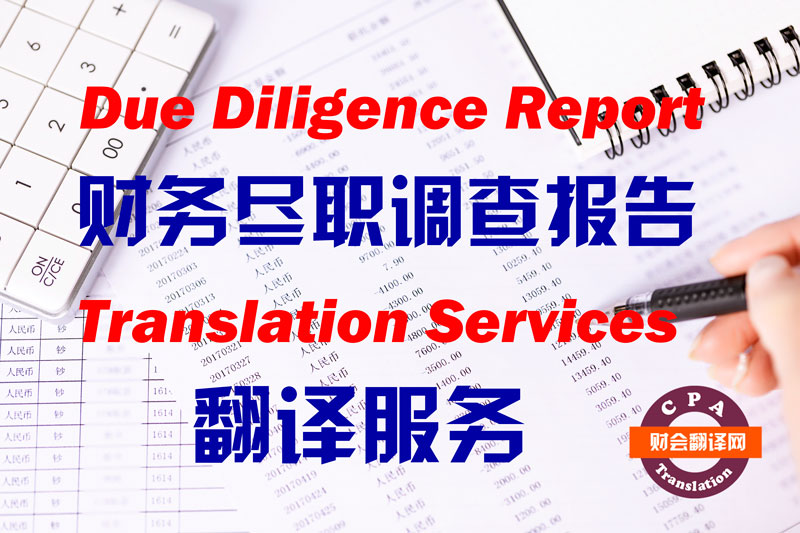CPA财会翻译网拥有多年财务尽职调查报告翻译经验,包括财务尽职调查报告中译英和英译中。财务尽职调查报告(英文:financial due diligence report 或 FDD Report)简称财务尽调报告,以下有关财务尽职调查报告的介绍由CPA财会翻译网翻译,版权所有,未经许可,不得转载。
财务尽职调查又称“谨慎性调查”,一般是指投资人在与目标企业达成初步合作意向后,经协商一致,投资人对目标企业一切与本次投资有关的事项进行现场调查、资料分析的一系列活动。其主要是在收购(投资)等资本运作活动时进行,但企业上市发行时,也会需要事先进行尽职调查,以初步了解是否具备上市的条件。
Financial due diligence, also known as “prudential investigation”, generally refers to a series of investigation activities conducted by the investor such as field surveys and information analysis, etc. to the target company with regard to all the matters involved in the investment, after the investor reaches a preliminary cooperation intention with the target company based on a consensus agreed upon through mutual discussions and consultations. Due diligence is mainly carried out during the process of capital operations such as acquisitions and mergers (investments), etc. However, when a corporation is about to go public and issue stock, it is also required to go through due diligence procedures in advance to be initially examined if it satisfies the conditions for being listed.
尽职调查的内容
Contents of due diligence
一般包括:目标企业所在行业研究、企业所有者、历史沿革、人力资源、营销与销售、研究与开发、生产与服务、采购、法律与监管、财务与会计、税收、管理信息系统等。
The contents of due diligence generally include: the target company's industry research, company’s owners, historical evolution, human resources, marketing and sales, R&D, production and services, procurements, legal and regulatory issues, finance and accounting, taxation, and management information system, etc.
尽职调查小组的构成
Formation of a due diligence team
项目负责人(交易促成者)、行业专家、业务专家、营销与销售专家、财务专家、法律专家等。
A due diligence team consists of project principal (transaction facilitator), industry experts, business experts, marketing and sales experts, financial experts and legal experts, etc.
尽职调查的目的
Purpose of due diligence:
完成一个尽职调查的目的是:判明潜在的致命缺陷和它们对收购及预期投资收益的可能的影响。
The purpose of completing a due diligence is to identify potential fatal defects and their possible impact upon the acquisition and expected returns on investment.
财务尽职调查的定义
Definition of financial due diligence:
在整个尽职调查体系中,财务尽职调查主要是指由财务专业人员针对目标企业中与投资有关财务状况的审阅、分析等调查内容。
In the entire due diligence system, financial due diligence mainly refers to the reviews and analysis performed by financial professionals regarding the financial position of the target company in connection with the investment.
在调查过程中,财务专业人员一般会用到以下一些基本方法:
- (1) 审阅:通过财务报表及其他财务资料审阅,发现关键及重大财务因素;
- (2) 分析性程序:如趋势分析、结构分析等,对各种渠道取得资料的分析,发现异常及重大问题;
- (3) 访谈:与企业内部各层级、各职能人员,以及中介机构的充分沟通;
- (4) 小组内部沟通:调查小组成员来自不同背景及专业,其相互沟通也是达成调查目的的方法。
During the due diligence investigation, financial professionals usually make use of the following basic methods:
- (1) Reviews: Review financial statements and other financial information to find key and significant financial factors;
- (2) Analytical procedures: Analyze the data obtained from various channels by use of trend analysis, structural analysis, etc. to discover abnormal and material problems;
- (3) Interviews: Make sufficient communications with the staffs from all functions at different levels within the company as well as with intermediate agencies;
- (4) Internal communications within the team: As the members of the due diligence team come from different backgrounds and expertise, making internal communications within the team is also an approach to reach the goal of the investigation.
由于财务尽职调查与一般审计的目的不同,因此财务尽职调查一般不采用函证、实物盘点、数据复算等财务审计方法,而更多使用趋势分析、结构分析等分析工具。在企业的投资并购等资本运作流程中,财务尽职调查是投资及整合方案设计、交易谈判、投资决策不可或缺的前提,是判断投资是否符合战略目标及投资原则的基础,对了解目标企业资产负债、内部控制、经营管理的真实情况,充分揭示其财务风险或危机,分析盈利能力、现金流,预测目标企业未来前景起到了重大作用。
Because the purpose of financial due diligence is different from that of an audit, financial due diligence normally does not apply financial audit methods such as request letter confirmations, physical inventory counts, and data recalculation, but apply analytical tools such as trend analysis and structural analysis, etc. In the process of corporate capital operations such as acquisitions and mergers, financial due diligence is an indispensable prerequisite for investment and integration planning design, transaction negotiations, and investment decision-making. It is a basis for judging whether the investment meets the strategic objectives and investment principles. And it plays a significant role in getting the understanding of the real conditions of the target company’s assets and liabilities, internal control, and its operations and management, fully disclosing its financial risks or crises, analyzing its profitability and cash flows, and forecasting its future prospects.

